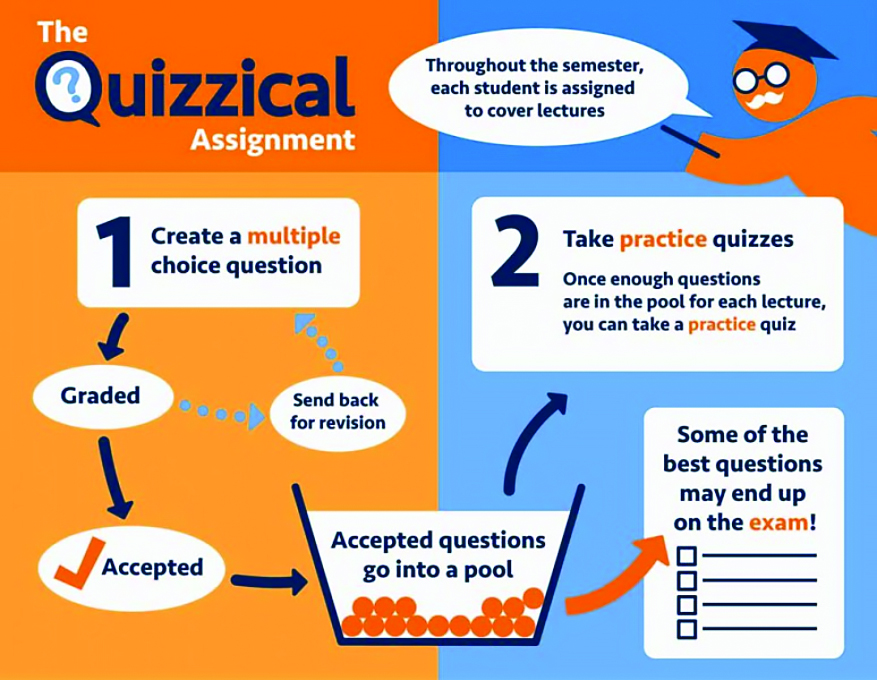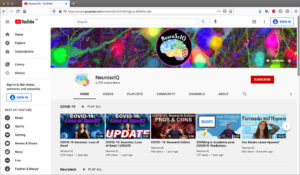| The impact of ITIF projects has been significant. Some have become part of the Educational Toolbox within Quercus, and are available to all instructors at the University of Toronto, and thus could impact the activities of thousands of students. Examples of these far-reaching projects include PeppeR, and Quizzical.
Collaboration and assessment for 1000s of students When the new version of Quizzical is complete, it should be usable for very large classes (1000+ students.) Other projects currently in development that address assessment could have similar impacts once completed and implemented— in this group we can put Comparative Judgement Classroom Response, Learning Objectives in Quercus, Online Quizzes by Crowdsourcing from Students, and Machine-Assisted Learning. Adaptive Testing for Korean Language Placement may have an international impact once implemented, and the underlying technology will a useful tool to adapt for other fields of study. Our Tri-Campus projects — Learning Skills Development and VEA2 for English Language Learners, are not faculty-specific, and can also have a wide-reaching impact on the University’s students. Other ITIF projects are more faculty-specific, and thus their initial impact is at a smaller scale of perhaps a 100-150 students per year. However, there are many that can be re-used year after year, and will have a long-lasting impact on how education is delivered in that faculty. This group includes learning module-style projects such as Clinical Faculty E-Development Program, Clinical Management of Cannabis Intoxication, Minor Ailment Prescribing Training, and P-A Learning & 360 videos for experiential education.
|
 Read more about the Educational Toolbox Read more about the Educational Toolbox
|
|
|
Learning modules and virtual labs during lockdown Since many ITIF projects use technology to provide learning tools and opportunities online and asynchronously, their value truly has been shown during the lockdown due to Covid19. We expect that this online learning is not a temporary change, and ITIF projects will become an integral part of either completely online or a blended learning space. ITIF 2017-2020 has 13 projects using Simulation or Virtual Labs to provide an online version of in-person laboratory experiences.
|
We are extremely thankful for the valuable support the ITIF award has provided us for this unique project and the opportunities it has brought us to work with a talented and dedicated team at MADLab. We hope we will be able to secure future funding either through ITIF again or LEAF grants to continue and finish this project, such that it is an app that can be disseminated widely to all the UofT community and across all the chemistry disciplines at different departments. Using 3-D Visualization Technology for Enhanced Student Lear |
|
|
Reaching an international audience Other projects have used a broadcast model through podcasts and YouTube videos to achieve a wide-ranging impact. YouTube for Medical and Graduate Disciplines, for example, has 6000+ subscribers and over 250,000 views to date; a 25-fold increase in traffic from its inception. Others in this category are Public Health Video from Multiple Perspectives, Podcast on Quality Improvement and Leadership, and Education in International Perspective: Piloting Courses for Enhanced Accessibility and Internationalization. |
|
|
We learned quite a bit about how to balance synchronous and asynchronous online learning and how to engage students using different modalities. The main challenge facing us was that students are based internationally and on different time-zones and are all fully employed professionals. They highly valued synchronous engagement with the professor and other students but their time was limited… The project provided important resources and support for launching a new online program and experimentation with use of new synchronous and asynchronous modalities for content delivery and interaction. Education in International Perspective: Piloting Courses for Enhanced Accessibility and Internationalization |
I have received two ITIF grants and my overall experience is outstanding. I am very grateful for the funding so that we can start embodying our ideas and make the ideas into a product that will be used in the classroom to engage with students. Tactile Response Experimental Analysis Toolkit (TREAT) |

